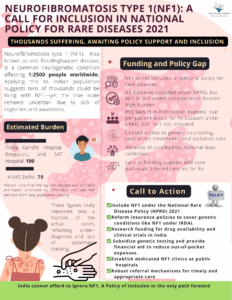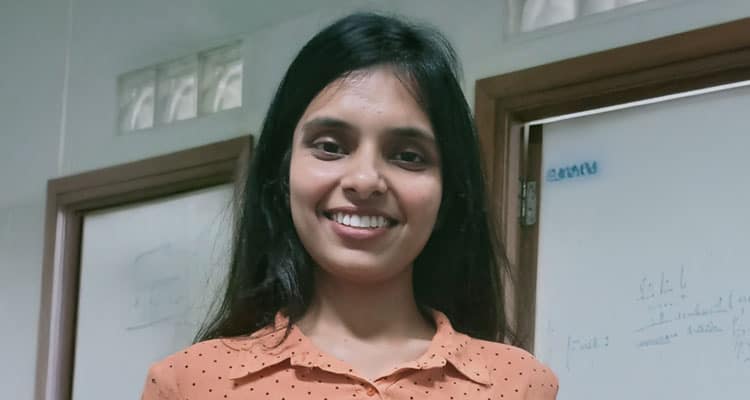Neurofibromatosis Type 1(Nf1): A call for inclusion in National Policy for Rare Diseases 2021
Dr Riya Agrawal highlights how the absence of Neurofibromatosis Type 1 (NF1) in the National Policy for Rare Diseases 2021 leaves families without financial support or systemic safeguards, despite the availability of specialised care in Delhi
The National Capital, offers access to premier public healthcare institutions for individuals living with Neurofibromatosis type 1 (NF1), but lacks comprehensive policy support, leaving many families struggling under financial and systemic burdens.
Among them, the All India Institute of Medical Sciences (AIIMS) and Maulana Azad Medical College (MAMC) have been designated as Centres of Excellence for rare diseases. These institutions provide critical services for patients, including genetic testing, neuroimaging, surgical interventions, and comprehensive multidisciplinary care involving neurologists, oncologists, dermatologists and ophthalmologists.
Despite the availability of such care, NF1 patients face long waiting times and a lack of dedicated rare disease units. Furthermore, the cost of treatment—even at subsidised public facilities—can still be overwhelming for many families, especially when it involves lifelong monitoring, surgeries, or specialised medications. Due to the high patient load and long waiting times for appointments, many patients are forced to undergo genetic testing at private laboratories, resulting in significant out-of-pocket expenses.
About NF1:
NF1 is a genetic, autosomal dominant disorder marked by extreme phenotypic heterogeneity — no two patients present the same symptoms. Clinical signs range from skin pigmentations and nerve tumors to skeletal deformities, cognitive disabilities, and even malignant cancers. Of the various tumor forms associated with NF1, plexiform neurofibromas, often congenital, are particularly aggressive and debilitating, leading to severe disfigurement, motor impairment, and psychological trauma, especially in children.
Policy Gaps: Illness Left Off the Map
Tragically, the reality for families affected by NF1 is not just a medical crisis — it is a policy void.
While 63 rare diseases have been included under the NPRD on the recommendations of the Central Technical Committee — granting financial support up to ₹50 lakhs per patient for treatment at designated Centres of Excellence (CoEs) — To date, only 1,118 patients across all rare diseases have benefited from this initiative. Notably, Neurofibromatosis Type 1 (NF1) has not been included under the NPRD, leaving patients without access to the policy’s financial and institutional support.
Though the Government of India launched the National Policy for Rare Diseases (NPRD) 2021, NF1 has not been included on its list of recognised and supported conditions. This has affected families waiting for government financial aid for treatment- related expenses. Efforts by Delhi-based patient groups, including formal representations to the Ministry of Health, have not yet yielded results.
Real Stories, Real Struggles
Bihan Biswas, a five-year-old boy from Kolkata, diagnosed with NF1, his future is uncertain — a childhood filled with doctor visits, rising medical bills, and no clarity on treatment access. His family lives in constant fear, fearing the uncertainty and not knowing who to turn to.
Or consider Mohi, just 2.5 years old, diagnosed in April 2025 with plexiform neurofibromas around her neck and chest. At just 9.8 kg, with weak limbs and delayed growth, Mohi’s family has searched across India for effective treatment. However, the only internationally recommended drug for NF1 remains sparsely and prohibitively expensive in India, leaving patients like Mohi without access to essential care.
What needs to change
- Inclusion of NF1 in the National Rare Disease Policy; To enable access to central government funding for treatment and care.
- Insurance reforms under IRDAI guidelines; To eliminate discrimination against genetic conditions like NF1.
- Establishment of dedicated NF1 clinics in public health institutions; Equipped with multidisciplinary teams and structured follow-up systems.
- Subsidised genetic testing and financial assistance programs to reduce the out-of-pocket burden on families.
- Official recognition and support for NF1 care networks. Including hospital-based and digital platforms to improve access to psychosocial support.
While Delhi is home to two Centres of Excellence for rare diseases—AIIMS and Maulana Azad Medical College (MAMC)— capable of managing NF1 medically, the lack of recognition under the national policy leaves families navigating this lifelong condition largely unsupported. A combination of policy inclusion, structured financial aid, and systemic reform is urgently needed to ensure that NF1 patients in the capital receive equitable and sustained care.

- Advertisement -


